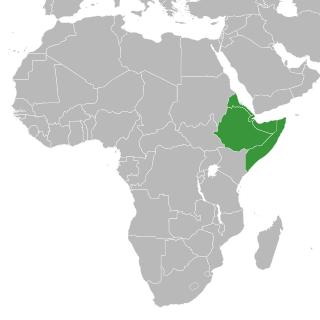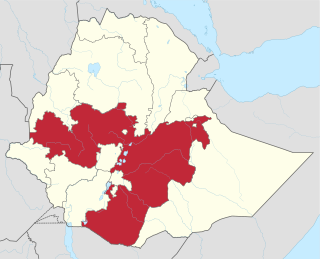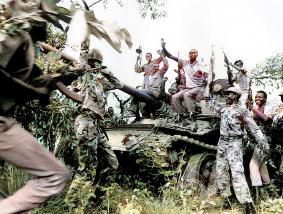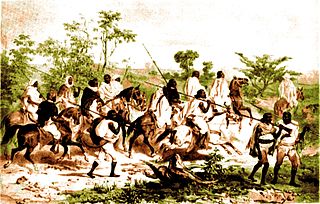 W
WThe British Expedition to Abyssinia was a rescue mission and punitive expedition carried out in 1868 by the armed forces of the British Empire against the Ethiopian Empire. Emperor Tewodros II of Ethiopia, then often referred to by the anglicized name Theodore, imprisoned several missionaries and two representatives of the British government in an attempt to force the British government to comply with his requests for military assistance. The punitive expedition launched by the British in response required the transportation of a sizable military force hundreds of miles across mountainous terrain lacking any road system. The formidable obstacles to the action were overcome by the commander of the expedition, General Sir Robert Napier, who was victorious in every battle against the troops of Tewodros, captured the Ethiopian capital, and rescued all the hostages. The expedition was widely hailed on its return for achieving all its objectives.
 W
WConflicts in the Horn of Africa have been occurring since the 17th century BCE. The Horn of Africa includes the nations of Djibouti, Eritrea, Ethiopia, Somalia and Somaliland.
 W
WThe Congo Crisis was a period of political upheaval and conflict in the Republic of the Congo between 1960 and 1965. The crisis began almost immediately after the Congo became independent from Belgium and ended, unofficially, with the entire country under the rule of Joseph-Désiré Mobutu. Constituting a series of civil wars, the Congo Crisis was also a proxy conflict in the Cold War, in which the Soviet Union and the United States supported opposing factions. Around 100,000 people are believed to have been killed during the crisis.
 W
WThe Eritrean War of Independence was a conflict fought between the Ethiopian government and Eritrean separatists from September 1961 to May 1991.
 W
WThe Eritrean–Ethiopian border conflict was a violent standoff and a proxy conflict between Eritrea and Ethiopia. It consisted of a series of incidents along the then-disputed border; including the Eritrean–Ethiopian War of 1998–2000 and the subsequent Second Afar insurgency. The border conflict was a continuation of the Eritrean–Ethiopian War of 1998–2000. It included multiple clashes with numerous casualties, including the Battle of Tsorona in 2016. Ethiopia stated in 2018 that it would cede Badme to Eritrea. This led to the Eritrea–Ethiopia summit on 9 July 2018, where an agreement was signed which demarcated the border and agreed a resumption of diplomatic relations.
 W
WThe Eritrean–Ethiopian War was a conflict that took place between Ethiopia and Eritrea from May 1998 to June 2000, with the final peace only agreed to in 2018, twenty years after the initial confrontation.
 W
WThe Ethiopian Civil War was a civil war in Ethiopia and present day Eritrea, fought between the Ethiopian military junta communist governments and Ethio-Eritrean anti-government rebels from September 1974 to June 1991.
 W
WThe Ethiopian–Egyptian War was a war between the Ethiopian Empire and the Khedivate of Egypt from 1874 to 1876, resulting in an unequivocal Ethiopian victory that accelerated the eventual downfall of Isma'il Pasha and dramatically reduced Egypt's prestige in the eyes of its European benefactors.
 W
WThe Insurgency in Ogaden was an armed conflict that took place from 1994 to 2018. It was fought by separatists, the Ogaden National Liberation Front (ONLF), against the Ethiopian government. The war began in 1994, when the ONLF attempted to recreate Greater Somalia by unifying Ethiopia's Somali Region with Somalia. It ended in a peace agreement as part of Prime Minister Abiy Ahmed's reforms.
 W
WThe Italian guerrilla war in Ethiopia was a conflict fought from the summer of 1941 to the autumn of 1943 by remnants of Italian troops in Ethiopia and Somalia, in a short-lived attempt to re-establish Italian East Africa. The guerrilla campaign was fought following the Italian defeat during the East African Campaign of World War II, while the war was still raging in Northern Africa and Europe.
 W
WThe Italo-Ethiopian War of 1887–1889 was an undeclared war between the Kingdom of Italy and the Ethiopian Empire occurring during the Italian colonization of Eritrea. The conflict ended with a treaty of friendship, which delimited the border between Ethiopia and Italian Eritrea but contained clauses whose different interpretations led to another Italo-Ethiopian war.
 W
WThe First Italo-Ethiopian War was fought between Italy and Ethiopia from 1895 to 1896. It originated from the disputed Treaty of Wuchale, which the Italians claimed turned Ethiopia into an Italian protectorate. Full-scale war broke out in 1895, with Italian troops from Italian Eritrea having initial success until Ethiopian troops counterattacked Italian positions and besieged the Italian fort of Mekele, forcing its surrender.
 W
WThe Second Italo-Ethiopian War, also referred to as the Second Italo-Abyssinian War, was a war of aggression which was fought between Italy and Ethiopia from October 1935 to February 1937. It is seen as an example of the expansionist policy that characterized the Axis powers and the ineffectiveness of the League of Nations before the outbreak of World War II.
 W
WThe Korean War was a war between North Korea and South Korea. The war began on 25 June 1950 when North Korea invaded South Korea following clashes along the border and insurrections in the south. The war unofficially ended on 27 July 1953 in an armistice.
 W
WThe Ogaden War, or the Ethio-Somali war, was a Somali military offensive between July 1977 and March 1978 over the disputed Ethiopian region of Ogaden, which began with the Somali invasion of Ethiopia. The Soviet Union disapproved of the invasion and ceased its support of Somalia, instead starting to support Ethiopia. Ethiopia was saved from a major defeat and a permanent loss of territory through a massive airlift of military supplies worth $1 billion, the arrival of between 16,000-24,000 Cuban troops sent by Fidel Castro to win a second African victory, and 1,500 Soviet advisors, led by General Vasily Petrov. The Ethiopians and Cubans prevailed at Harar, Dire Dawa and Jijiga, and began to push the Somalis systematically out of the Ogaden. By March 1978, the Ethiopians and Cubans had captured almost all of the Ogaden, prompting the defeated Somalis to give up their claim to the region. The Somalis took a terrible beating from Cuban artillery and aerial assaults.
 W
WThe Oromo conflict is longstanding conflicts between Oromian separatists and the Government of Ethiopia. The OLF originally fought the Ethiopian Empire to liberate Oromo people and establish an independent Oromia state along with ELF and TPLF. Despite being the largest ethnic group with more than a third of the country’s population, the Oromo people have historically been marginalized from central roles in national politics and, many say, borne the brunt of historical injustices. The conflict began in 1973, when Oromo nationalists established the OLF and its armed wing, the Oromo Liberation Army (OLA).
 W
WThe Ottoman-Portuguese conflicts of 1538 to 1559 were a series of armed military encounters between the Portuguese Empire, the Kingdom of Hormuz, and the Ethiopian Empire against the Ottoman Empire and Adal Sultanate, in the Indian Ocean, the Persian Gulf, the Red Sea, and in East Africa. This is a period of battles in The Ottoman-Portuguese War.
 W
WThe Second Afar insurgency is an ongoing insurgency in the Afar Region of Ethiopia and the Southern Red Sea Region of Eritrea, waged by various Afar rebel groups. Both Ethiopia and Eritrea have supported different rebel groups in the region in a proxy war, and have occasionally engaged in border skirmishes with each other, as well as with opposing rebel groups.
 W
WThe Second Sudanese Civil War was a conflict from 1983 to 2005 between the central Sudanese government and the Sudan People's Liberation Army. It was largely a continuation of the First Sudanese Civil War of 1955 to 1972. Although it originated in southern Sudan, the civil war spread to the Nuba mountains and the Blue Nile. It lasted for 22 years and is one of the longest civil wars on record. The war resulted in the independence of South Sudan six years after the war ended.
 W
WThe Somalia War, Ethiopian Invasion Of Somalia, or Ethiopian intervention in Somali Civil War, was an armed conflict involving largely Ethiopian and Somali Transitional Federal Government (TFG) forces and Somali troops from Puntland versus the Somali Islamist umbrella group, the Islamic Court Union (ICU), and other affiliated militias for control of the country. The war officially began shortly before July 20, 2006 when U.S-backed Ethiopian troops invaded Somalia to prop up the TFG in Baidoa. The TFG in Somalia invited Ethiopians to intervene, which became an "unpopular decision". Subsequently, the leader of the ICU, Sheik Hassan Dahir Aweys, had declared that, "Somalia is in a state of war, and all Somalis should take part in this struggle against Ethiopia". On December 24, Ethiopia stated it would actively combat the ICU.
 W
WThe 2009–present phase of the Somali Civil War is concentrated in southern and central Somalia and portions of north eastern Kenya. It began in early February 2009 with the conflict between the forces of the Federal Government of Somalia, assisted by African Union peacekeeping troops, and various militant groups and factions. The violence has displaced thousands of people in the southern part of the country. The conflict has also seen fighting between the Sufi Ahlu Sunna Waljama'a and Al-Shabaab.
 W
WThe War on terror, also known as the Global War on Terrorism and U.S. War on Terror, is an international military campaign launched by the United States government after the September 11 attacks. The targets of the campaign are primarily Sunni Islamic fundamentalist armed groups located throughout the Muslim world, with the most prominent groups being Al-Qaeda, the Islamic State, the Taliban, Tehrik-i-Taliban Pakistan, and the various franchise groups of the former two organizations. The naming of the campaign uses a metaphor of war to refer to a variety of actions that do not constitute a specific war as traditionally defined. U.S. president George W. Bush first used the term "war on terrorism" on 16 September 2001, and then "war on terror" a few days later in a formal speech to Congress. In the latter speech, George Bush stated, "Our enemy is a radical network of terrorists and every government that supports them." The term was originally used with a particular focus on countries associated with al-Qaeda. The term was immediately criticised by such people as Richard B. Myers, chairman of the Joint Chiefs of Staff, and more nuanced terms subsequently came to be used by the Bush administration to publicly define the international campaign led by the U.S. While it was never used as a formal designation of U.S. operations in internal government documentation, a Global War on Terrorism Service Medal was issued.
 W
WWorld War II, also known as the Second World War, was a global war that lasted from 1939 to 1945. It involved the vast majority of the world's countries—including all the great powers—forming two opposing military alliances: the Allies and the Axis. In a state of total war, directly involving more than 100 million people from more than 30 countries, the major participants threw their entire economic, industrial, and scientific capabilities behind the war effort, blurring the distinction between civilian and military resources. World War II was the deadliest conflict in human history, marked by 70 to 85 million fatalities. Tens of millions of people died due to genocides, premeditated death from starvation, massacres, and disease. Aircraft played a major role in the conflict, including in the use of strategic bombing of population centres, and the only uses of nuclear weapons in war.
 W
WWoyane rebellion was a rebellion in Tigray Province, Ethiopia against the government of Emperor Haile Selassie which took place in September–November 1943. The rebels were defeated with the support of aircraft from the United Kingdom's Royal Air Force.
 W
WThe Zemene Mesafint was a period in Ethiopian history between the mid-18th and mid-19th centuries when the country was de facto divided within itself into several regions with no effective central authority. It was a period in which the Emperors from the Solomonic dynasty were reduced to little more than figureheads confined to the capital city of Gondar.